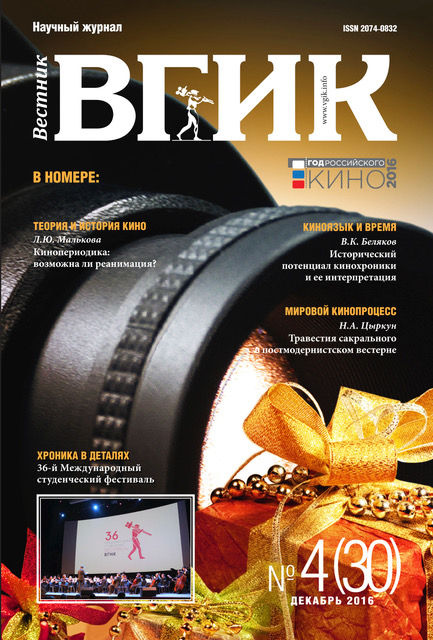«Pulsating Organizations» in Culture
- Authors: Gordin V.E1, Elkanova E.M1
-
Affiliations:
- НИУ «Высшая школа экономики» в Санкт-Петербурге
- Issue: Vol 8, No 4 (2016)
- Pages: 136-144
- Section: FILM BUSINESS | MANAGEMENT STRATEGY AND TACTICS
- URL: https://journals.eco-vector.com/2074-0832/article/view/14689
- DOI: https://doi.org/10.17816/VGIK84136-144
- ID: 14689
Cite item
Full Text
Abstract
The authors examine managerial practices of pulsating cultural institutions arranging film festivals and awards’ procedures. The machinery of any repeatable film festival implies cycling pattern, that is passing through certain sequential stages with the purpose of their own. Event operational activity is characterized by peaks before and during the event and falls after the festival execution. «Pulsating organizations» concept is used to highlight film festivals specific nature with the scope of activities that expands and shrinks. Despite the fact that organizational and economic mechanism of the event activities is characterized by unique features associated with the discrete service delivery (including cash flows intermittency, the need in new sources of funding, demand in staff during concrete stages of the festival cycle), there are no special publications analyzing a festival as an organization or within the management framework. tte pulsating effect which emphasizes primarily changes in the number of employees, has an impact on the inner organizational processes, as well as on its external environment, e.g. customer relationship management. Analysis of pulsating effect overcoming models will help to identify the algorithm of more efficient policies for film festival structures’ management.
About the authors
Valeriy E Gordin
НИУ «Высшая школа экономики» в Санкт-Петербурге
Author for correspondence.
Email: editor@vestnik-vgik.com
PhD (Economics), Professor; Higher School of Economics
St. PetersburgElena M Elkanova
НИУ «Высшая школа экономики» в Санкт-Петербурге
Email: editor@vestnik-vgik.com
Post-Graduate student, Higher School of Economics
St. PetersburgReferences
- Гордин В.Э., Хорева Л.В., Дедова М.А. Применение теории стейкхолдеров в системе управления услугами фестивалей культуры // Известия Санкт-Петербургского государственного экономического университета, № 5, 2015. - С. 56-65.
- Минцберг Г. Структура в кулаке: создание эффективной организации: пер. с англ. - СПб.: Питер, 2011. - 512 с.
- Тоффлер Э. Метаморфозы власти: пер. с англ. - М.: «Издательство ACT», 2003. - 669 с.
- Эльканова Е.М. Адаптация теории командопостроения к пульсирующим организациям культуры // Известия Санкт-Петербургского государственного экономического университета, № 3 (99), 2016. - С. 171-175.
- Caves R.E. Contracts between Art and Commerce // The Journal of Economic Perspectives. Vol. 17, № 2, 2003. - P. 73-84.
- Lovelock C.H. Classifying Services to Gain Strategic Marketing Insights // Journal of Marketing. Vol. 47, Issue 3, 1983. - P 9-20.
- Ruling C.-C., Pedersen J.S. Film festival research from an organizational studies. Perspective // Scandinavian Journal of Management, № 26, 2010. - P 318-323.
- Lovelock C.H. Classifying Services to Gain Strategic Marketing Insights// Journal of Marketing. Vol. 47, Issue 3, 1983. P. 13-18.
- Caves R.E. Contracts between Art and Commerce // The Journal of Economic Perspectives. Vol. 17, №. 2, 2003. P. 74.
- Ruling C.-C. Pedersen J.S. Film festival research from an organizational studies // Perspective. Scandinavian Journal of Management, № 26, 2010. P. 321.
- Эльканова Е.М. Адаптация теории командопостроения к пульсирующим организациям культуры // Известия Санкт-Петербургского государственного экономического университета, № 3 (99), 2016. С. 174.
- Гордин В.Э., Хорева Л.В., Дедова М.А. Применение теории стейкхолдеров в системе управления услугами фестивалей культуры // Известия Санкт-Петербургского государственного экономического университета, 2015, № 5. С. 63
- Разлогов К. Э. Роль кинофестивалей в развитии экранной культуры в России // Ярославский педагогический вестник. № 4. Том I (Гуманитарные науки), 2013. C. 251255.;
- De Valck M. Film festivals: From European geopolitics to global cinephilia. Amsterdam: Amsterdam University Press, 2007;
- Evans O. Border exchanges: The role of the European Film Festival // Journal of Contemporary European Studies. № 15 (1), 2007. P. 23-33.
- Baez A. & Devesa M. Segmenting and profiling attendees of a film festival // International Journal of Event and Festival Management. № 5 (2), 2014. P. 96-115.
- Yolal M., Rus R. V., Cosma S. & Gursoy D. A Pilot Study on Spectators’ Motivations and Their SocioEconomic Perceptions of a Film Festival // Journal of Convention & Event Tourism. № 16, 2015. P. 253-271.
- Lauzen M. M. Image repair: A case study of Thierry Frémaux and the Cannes Film Festival // Public Relations Review. № 42, 2016. P. 170-175.
- Ruling C.-C., Pedersen J. S. Film festival research from an organizational studies // Perspective. Scandinavian Journal of Management. № 26, 2010. P. 318-323.
- Ruling C.-C., Pedersen J.S. Film festival research from an organizational studies // Perspective. Scandinavian Journal of Management. № 26, 2010. P. 318-323.;
- Hanlon C., Cuskelly G. Pulsating major sport event organizations: а framework for inducting managerial personnel. Event Management, 7 (4), 2002. P. 231-243.
- Hanlon C., Cuskelly G. Pulsating major sport event organizations: A framework for inducting managerial personnel // Event Management, 7 (4), 2002. P. 231-243.
- Clayton D. Knowledge Sharing in Pulsating Organizations: the Experiences of Music Festival Volunteers // 2014 // URL: https: //ore. exeter.ac.uk/ repository/ bitstream/handle/ 10871/ 16238/ ClaytonD. pdf? sequence= 1&is Allowed=y (дата обращения: 31.05.2016).
- Carlsson-Wall M. et al. Management control in pulsating organizations. A multiple case study of popular culture events // Management Accounting Research // 2016 // URL: http:// www.sciencedirect. com/ science/ article/ pii/ S1044500516000123 (дата обращения: 31.05.2016).
- Gantt H.L. Organizing for Work, Harcourt, Brace, and Howe, New York, 1919. Reprinted by Hive Publishing Company, Easton, Maryland, 1973.
- Taylor F.W The Principles of Scientific Management. NY, US and London, UK: Harper & Brothers, 1911.
- Bennis W. The Temporary Society. New York: Harper & Row, 1968.
- Toffler A. Future Shock. NJ: Bantam Books. 1990. P. 541.
- Минцберг Г. Структура в кулаке: создание эффективной организации [пер. с англ]. СПб.: Питер, 2011. С. 462.
- Weber M. Wirtschaft und Gesellschaft. Grundriss der verstehenden Soziologie. Aufl. Besorgt von J. Winckelmann, Tübingen: Mohr, 1956 (Zwei Halbbände) (Nachdruck 1964).
- Burns T. & Stalker G.M. The Management of Innovation, Tavistock. London, 1961.
Supplementary files








